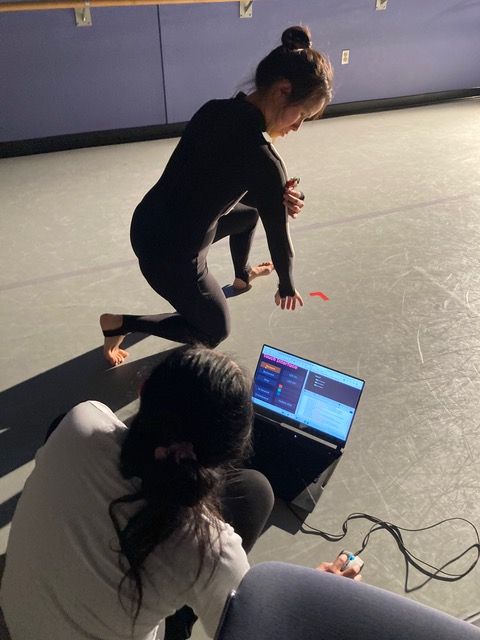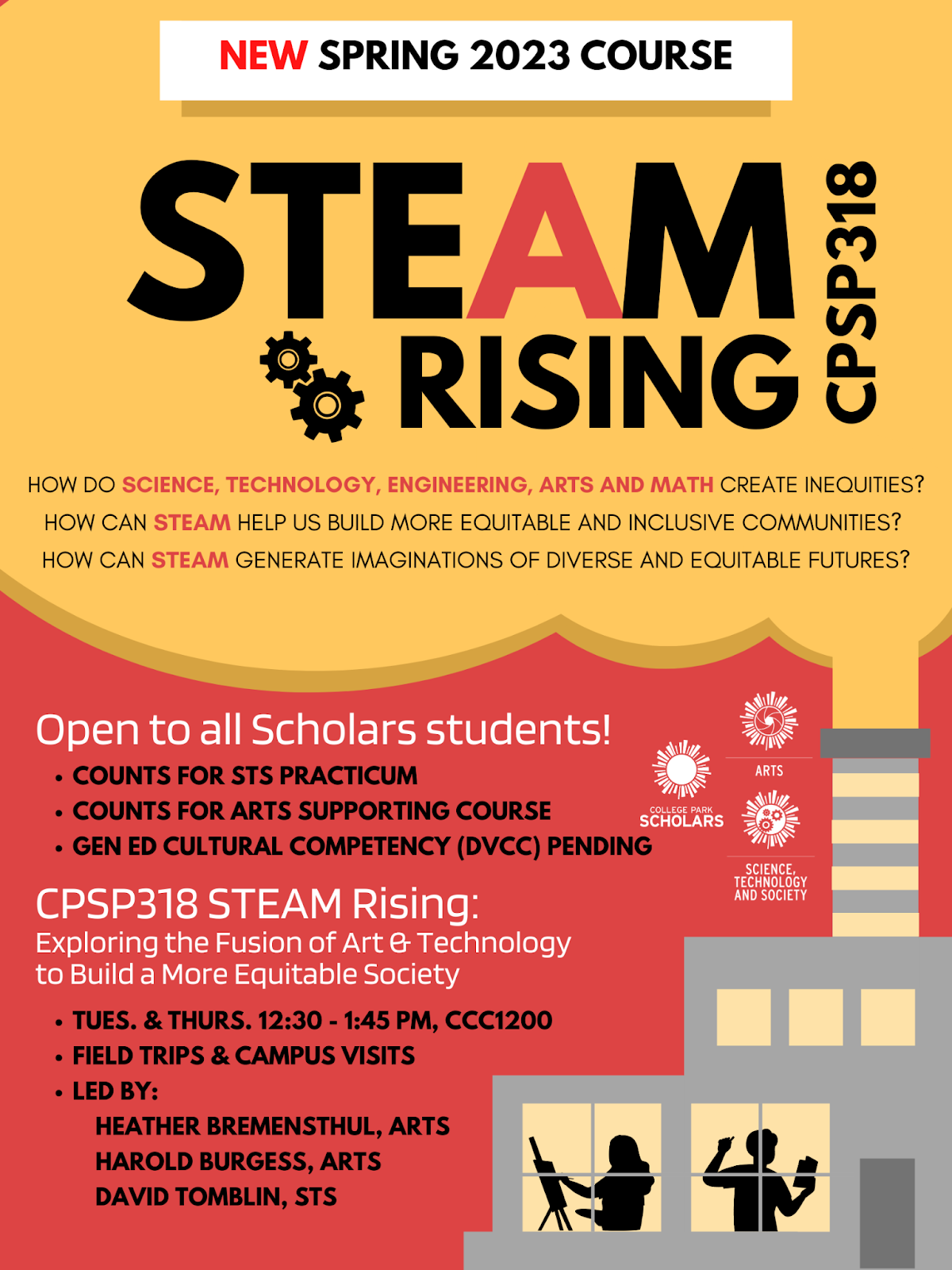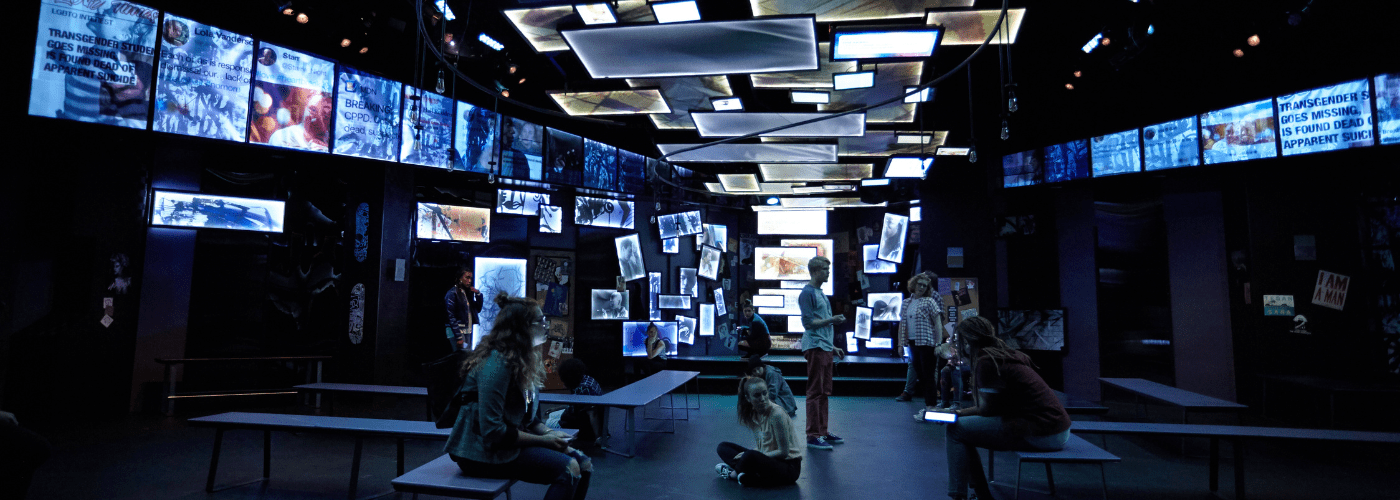ArtsAmplification Collaborative Grant Awards 2022
ArtsAMP Collaborative Grants are designed to support collaboration between faculty in the arts and faculty in other disciplines as they move to advance the goals of Arts for All by creating new artistic work, new scholarship on the arts, and new classes that further the creative experience of students.
Three interdisciplinary teams received funding to support their projects and presented them at the first annual ArtsAMP Symposium.
ArtsAMP Collaborative Faculty Grant, 2022
“Dance2: Interactive Dance Performance through On-body Wearable Robot and Crowd Participation”
 Working at the intersection of dance and robotics, faculty in dance, computing, and information science created DancexDance, an interactive performance inspired by Square Dancing and Crowdsourcing. The performance is a duet between the dancer and Calico, a wearable robot that uses sensors and actuators to move around the dancer’s body. The motion and light effects of the wearable robot directly contribute to the performed dance movements. But DANCE2 is also a trio, as the audience uses a custom-built, browser-based smartphone interface to collectively instruct Calico’s movements. Through the medium of dance, the performance explores the relationship between the digital collective and the individual.
Working at the intersection of dance and robotics, faculty in dance, computing, and information science created DancexDance, an interactive performance inspired by Square Dancing and Crowdsourcing. The performance is a duet between the dancer and Calico, a wearable robot that uses sensors and actuators to move around the dancer’s body. The motion and light effects of the wearable robot directly contribute to the performed dance movements. But DANCE2 is also a trio, as the audience uses a custom-built, browser-based smartphone interface to collectively instruct Calico’s movements. Through the medium of dance, the performance explores the relationship between the digital collective and the individual.
This collaborative project brought together faculty and graduate students in Immersive Media Design, Computer Science, Information Science, and the School of Theatre, Dance, and Performance Studies. A working draft of the piece was presented publically, which allowed the team to test the overall narrative, design, and user experience. By prioritizing design-thinking and quick implementation, the team learned by both building and breaking. A revised version of the piece will be presented at the Faculty Dance Concert at the Clarice in March of 2023.
Computer Science
Huaishu Peng (Technical Lead, Co-Creator)
Anup Sathya Sai Kumar (Robot Designer, UI Engineer)
Jiasheng Li (Robot Designer)
Zeyu Yan (Track Fabricator)
Immersive Media Design
Jonathan David Martin (Director, Co-Creator)
Information Science
Bill Kules (UI Designer, Co-Choreographer, Co-Creator)
Christopher Maxey (UI Engineer)
Theatre, Dance, and Performance Studies
Adriane Fang (Co-Choreographer/Performer, Co-Creator)
Anna Adhikari (Performer)
Samuel Crawford (Sound Designer)
Mark Williams (Data Flow Engineer)
Becca Janney (Costume Designer)
Rashonda Lazar (Projections Designer)
Scott Monnin (Lighting Designer)
Marielis Garcia (Associate Director)
ArtsAMP Collaborative Faculty Grant, 2022
“Rooting Our Shared Stories in Shared Places: Community-Centered African American Heritage Interpretation”
Using digital documentation of heritage sites that Dr. Stefan Woehlke and his students completed using laser scanning and photogrammetry in North Brentwood, Maryland, this collaborative project will result in a course that will guide students through a community-centered interpretive process that includes inventorying historic records, collection and digitization of print materials, and the selection of stories and supporting materials that will be integrated into the digital heritage spaces for public consumption. Centering the voices of local residents, this project will also include oral histories, legal documents, maps, and photographs to help tell the story of the first African American majority municipality in Maryland. As team member Dr. Quint Gregory explained, “what comes out of these partnerships between UMD and local communities can be powerful.”
The final project will manifest in one of a number of digital platforms, from a video game, to a documentary, website, storymap, or perhaps a novel platform under development for the interpretation of 3-D data. “The unknown makes the course dynamic and exciting,” says Woehlke. “We look forward to working with a great group of students and community members to tell important histories that everyone will connect with in different ways.”
Henry Duval Gregory, The Michelle Smith Collaboratory for Visual Culture
Stefan Francis Woehlke, Historic Preservation Program
ArtsAMP Collaborative Faculty Grant, 2022
“STEAM Rising: Exploring the Fusion of Art and Technology to Build a More Equitable Society”
 In Spring 2023, the Arts Scholars program and the Science, Technology, & Society Scholars program will launch a new course: “STEAM Rising: Exploring the fusion of art and technology to build a more equitable society.” The course will explore how the fusion of art, science, and technology can help us build a more equitable society. The multi-disciplinary teaching team will tackle this question by introducing concepts from Science and Technology Studies combined with the interdisciplinary nature of the arts to critically examine relationships between art, technology, and society to help students imagine more equitable futures. Students will learn to integrate ethnographic data collection skills, a critical systems thinking mindset, and a variety of art concepts and techniques to develop campus redesign proposals, art installations, and other media to critically examine the intersection of art and technology as they seek to address the grand challenges of our time.
In Spring 2023, the Arts Scholars program and the Science, Technology, & Society Scholars program will launch a new course: “STEAM Rising: Exploring the fusion of art and technology to build a more equitable society.” The course will explore how the fusion of art, science, and technology can help us build a more equitable society. The multi-disciplinary teaching team will tackle this question by introducing concepts from Science and Technology Studies combined with the interdisciplinary nature of the arts to critically examine relationships between art, technology, and society to help students imagine more equitable futures. Students will learn to integrate ethnographic data collection skills, a critical systems thinking mindset, and a variety of art concepts and techniques to develop campus redesign proposals, art installations, and other media to critically examine the intersection of art and technology as they seek to address the grand challenges of our time.
This new course brings together faculty expertise from a variety of disciplines: science and technology studies, theatrical design, architecture, and sociology. Moreover, the course will allow students to engage in dialogue across differences by reflecting on their own experiences with the arts and technology as subcultures with their own unique norms and values. They will also have the opportunity to explore imaginative applications of art and technology and the ways they can be used to generate more equitable and inclusive worlds through visits to the University of Maryland creative makerspaces.
Heather-Erin Bremenstuhl, College Park Scholars (Arts)
Harold F. Burgess, College Park Scholars (Arts)
David Tomblin, College Park Scholars (Science, Technology and Society)

